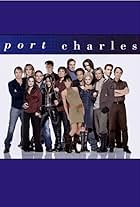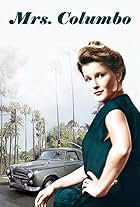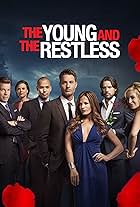The trials and tribulations of The Ryans, an Irish-American family in New York City.The trials and tribulations of The Ryans, an Irish-American family in New York City.The trials and tribulations of The Ryans, an Irish-American family in New York City.
- Awards
- 29 wins & 47 nominations
Browse episodes
Storyline
Did you know
- TriviaChristine Ebersole's TV debut.
- Crazy creditsMedical Instrumentation courtesy of Hewlett-Packard
- ConnectionsFeatured in Love Child (1982)
Featured review
It started off with the show's hero being found unconcious at the bottom of a flight of stairs and ended on a happy note with the wedding of that character's brother-in-law. It all took place in New York City at an Irish Pub owned by Irish immigrants who raised five children and dolled out advice and love with humor, drama, and sometimes reluctance.
Maeve and Johnny Ryan were the matriarch and patriarch of the show. Maeve, played by the beloved musical stage veteran Helen Gallagher (winner of two Emmys for this show), was outspoken yet loving. She always saw the motives behind people's actions, even when they hurt the ones she loved. Johnny was a hot-tempered yet tender former boxer who had fallen in love with Maeve in Ireland and brought her to the United States years before. (At the time Maeve and Johnny would have come to the states, Ms. Gallagher was busy on Broadway in such musical shows as "Seven Lively Arts" and "High Button Shoes"). They had five children: politician Frank; doctor Patrick; reporter Mary; rebellious Siobhan (later a cop) and happilly married Kathleen. At the start of the show, Kathleen was off living in Pittsburgh (and only made a few appearances during the show's 13 1/2 year run), and Siobhan was living in the mid-west. Frank was unconcious in a coma after being pushed down a flight of stairs; Pat was an intern at the nearby Riverside Hospital; and Mary was working on Frank's campaign for city council. Of the five kids, only Kathleen and Frank were married; We only saw Kathleen's husband, Art Thompson, very briefly, but Frank's baby-doll like wife Delia would remain the show's antagonist for most of the run.
Then, there were their friends, the Coleridges, who also remained important; Frank and attorney Jill Coleridge were lovers who suffered for years to get together; Jill's brother, Roger, was an amoral doctor, as was his sister Faith (an intern at the outset) and father Ed, written off early in the run. Other major characters at the beginning were Delia's brother, Bob Reid (Frank's best friend) and an embittered reporter named Jack Fenelli, perhaps the most complex character on the show. Jack and Mary were romantically involved much to Johnny Ryan's chagrin. As the story developed, we watched how Maeve welcomed him into her heart, and how he slowly embraced her as a mother figure he hadn't had since being raised in an orphanage with the help of Sister Mary Joel.
Four members of the original cast remained with the show throughout its run, and were followed by a few who left, came back, left, and came back again. Helen Gallagher and Bernard Barrow were the only actors as Ryans to remain the entire time; Ron Hale (Roger, now Mike on "GH") and Michael Levin (Jack) also remained without departing. While the role of Frank had five actors over the years, and Mary was "killed off" after 4 1/2 years and five actresses (most notably the amazing Kate Mulgrew), we saw Ilene Kristen (now "One Life to Live's" Roxie) and Malcolm Groome leave and return twice as Delia and Pat. Kristen's performance as the devious yet lovable Delia was filled with subtle touches that made her less of a villianess and more of a realistic young woman; When Randall Edwards took over for a time, she did get a few chances, particularly when Delia ran down a lover she had discovered was cheating on her. That performance got Edwards an Emmy Nomination, but sadly, Kristen was never nominated.
The role of Faith Coleridge was played by five actors as well, while her siblings Roger and Jill were played only by one each. Ron Hale made his somewhat nefarious character understandable, while Jill, who was the show's central heroine after Kate Mulgrew's departure, was a complex good woman who could sometimes be aggrivating with her high moral standards. The late Nancy Addison always played the role with dignity and consistency so it was difficult to hate her for her judgements. She tended to stand up for the underdog and as much as Jillian hated Delia for her schemes, we know that she did understand her. When Jill defended Dr. Seneca Beaulac (John Gabriel) for the mercy killing of his wife, we knew that she believed in the cause she was fighting for her; It was very ironic that a few years later, she was accused of the same crime. The Jill/Seneca/Frank storyline was front-burner for three years and won Emmy Nominations for all of the performers in this storyline.
Over the years, some of today's hottest soap stars made appearances on the show: Justin Deas, Julia Barr, and Robin Mattson (as one of the Delia's), but were rather wasted. One veteran soap actress who came on the show two years in the run and put her stamp on an original role was Louise Shaffer, now a novel writer and occassional script writer for soaps. Shaffer played the wealthy Rae Woodard who for over half a decade and became involved in practically every storyline. She deservedly won an Emmy, yet ended up losing her job in 1983 after the writers had put her on front burner with what many of the show's cast members refered to that eras as "Kirkland's Hope". Not only did Rae have an affair with Roger, she also became engaged to Frank briefly and then found that she was involved in an affair with the same young man as her bratty daughter, Kim (Kelli Maroney). During this time, Earl Hindman's real-life wife Molly McGreevy played the delightfully eccentric Polly Longworth, Rae's best friend. At this time, "RH" began to delve into mob storylines thanks to Siobhan Ryan's marriage to Joe Novak (Richard Muenz, Roscoe Born). Siobhan was played by six actresses, most notably Sarah Felder (as the lovably irritating first Siobhan) and Marg Helkenberger (as the more mature cop, closer to Mary than how Siobhan had been introduced).
SoapNet ran the original 1975-81 episodes before switching back to the early years. There were changes in structure in late 1983 when a series of veteran characters began being written off (Faith, Seneca, Bob, Rae, briefly Delia), and new writers gave us unbelievable plot twists (Johnny's illegitimate son, Dakota, being the biggest crime). We did get the original Pat and Delia back, and the actress who played the wife Seneca had pulled the plug on came back in another role. In the show's last month, some of the core characters from the early years did come back as Jack finally got over his wife Mary's death and found a woman he could marry. Fans forgave the writers for such bad storylines as Delia's kidnapping by a gorilla and Faith's engagement to Frank, but the premiere of "Loving", which caused "Ryan's Hope" to move timeslots, was the beginning of the end. Younger characters such as Maggie Shelby (Jill's half sister), Rick Hyde (Grant Show), as well as the teenaged Ryan Fenelli (Yasmine Bleeth) and John Ryan Jr. took time away from the veterans. By the time Jack was engaged at the end of the show, he had gone through so many love interests that the fans lost count.
Still, there were many memorable moments to go around for those who wanted to see the show in re-runs when it came back in the early 2000's. Delia and Roger's early schemes were believable and not all evil; Jill's moral judgements; John's hatred of Jack; Faith's mental illnesses; Rae's determination to control the men she was involved with; Siobhan's desire to fit in with her family; and Mary's resentment of Siobhan's immaturity all made for great family drama. Subtle moments of Irish folklore (Maeve's sister Annie's need for money to keep up the family farm; Tom Desmond's attempts to escape his past; and ultimately the MacCurtain family's revenge on Maeve and Johnny) gave the veteran characters a lot of meaty material to work with. It couldn't have been done without the writing of Claire Labine and Paul Avila Mayer who knew how to flesh out their characters with faults and needs. "Ryan's Hope" managed to take formula soap opera structure and take it where no other soap had gone before. Too bad the network decided to ruin it with typical mobsters and crime drama made successful on "General Hospital" in the early 1980's. Awards are given to shows that don't go for trends yet try and create new ones of their own. Perhaps now that "Port Charles" is off the air and ABC needs a new soap, we could see "Ryan's Hope-the Next Generation". Sadly, there won't be Johnny or Jill (you could never recast those parts), but many of the show's veteran cast members are still around.
Maeve and Johnny Ryan were the matriarch and patriarch of the show. Maeve, played by the beloved musical stage veteran Helen Gallagher (winner of two Emmys for this show), was outspoken yet loving. She always saw the motives behind people's actions, even when they hurt the ones she loved. Johnny was a hot-tempered yet tender former boxer who had fallen in love with Maeve in Ireland and brought her to the United States years before. (At the time Maeve and Johnny would have come to the states, Ms. Gallagher was busy on Broadway in such musical shows as "Seven Lively Arts" and "High Button Shoes"). They had five children: politician Frank; doctor Patrick; reporter Mary; rebellious Siobhan (later a cop) and happilly married Kathleen. At the start of the show, Kathleen was off living in Pittsburgh (and only made a few appearances during the show's 13 1/2 year run), and Siobhan was living in the mid-west. Frank was unconcious in a coma after being pushed down a flight of stairs; Pat was an intern at the nearby Riverside Hospital; and Mary was working on Frank's campaign for city council. Of the five kids, only Kathleen and Frank were married; We only saw Kathleen's husband, Art Thompson, very briefly, but Frank's baby-doll like wife Delia would remain the show's antagonist for most of the run.
Then, there were their friends, the Coleridges, who also remained important; Frank and attorney Jill Coleridge were lovers who suffered for years to get together; Jill's brother, Roger, was an amoral doctor, as was his sister Faith (an intern at the outset) and father Ed, written off early in the run. Other major characters at the beginning were Delia's brother, Bob Reid (Frank's best friend) and an embittered reporter named Jack Fenelli, perhaps the most complex character on the show. Jack and Mary were romantically involved much to Johnny Ryan's chagrin. As the story developed, we watched how Maeve welcomed him into her heart, and how he slowly embraced her as a mother figure he hadn't had since being raised in an orphanage with the help of Sister Mary Joel.
Four members of the original cast remained with the show throughout its run, and were followed by a few who left, came back, left, and came back again. Helen Gallagher and Bernard Barrow were the only actors as Ryans to remain the entire time; Ron Hale (Roger, now Mike on "GH") and Michael Levin (Jack) also remained without departing. While the role of Frank had five actors over the years, and Mary was "killed off" after 4 1/2 years and five actresses (most notably the amazing Kate Mulgrew), we saw Ilene Kristen (now "One Life to Live's" Roxie) and Malcolm Groome leave and return twice as Delia and Pat. Kristen's performance as the devious yet lovable Delia was filled with subtle touches that made her less of a villianess and more of a realistic young woman; When Randall Edwards took over for a time, she did get a few chances, particularly when Delia ran down a lover she had discovered was cheating on her. That performance got Edwards an Emmy Nomination, but sadly, Kristen was never nominated.
The role of Faith Coleridge was played by five actors as well, while her siblings Roger and Jill were played only by one each. Ron Hale made his somewhat nefarious character understandable, while Jill, who was the show's central heroine after Kate Mulgrew's departure, was a complex good woman who could sometimes be aggrivating with her high moral standards. The late Nancy Addison always played the role with dignity and consistency so it was difficult to hate her for her judgements. She tended to stand up for the underdog and as much as Jillian hated Delia for her schemes, we know that she did understand her. When Jill defended Dr. Seneca Beaulac (John Gabriel) for the mercy killing of his wife, we knew that she believed in the cause she was fighting for her; It was very ironic that a few years later, she was accused of the same crime. The Jill/Seneca/Frank storyline was front-burner for three years and won Emmy Nominations for all of the performers in this storyline.
Over the years, some of today's hottest soap stars made appearances on the show: Justin Deas, Julia Barr, and Robin Mattson (as one of the Delia's), but were rather wasted. One veteran soap actress who came on the show two years in the run and put her stamp on an original role was Louise Shaffer, now a novel writer and occassional script writer for soaps. Shaffer played the wealthy Rae Woodard who for over half a decade and became involved in practically every storyline. She deservedly won an Emmy, yet ended up losing her job in 1983 after the writers had put her on front burner with what many of the show's cast members refered to that eras as "Kirkland's Hope". Not only did Rae have an affair with Roger, she also became engaged to Frank briefly and then found that she was involved in an affair with the same young man as her bratty daughter, Kim (Kelli Maroney). During this time, Earl Hindman's real-life wife Molly McGreevy played the delightfully eccentric Polly Longworth, Rae's best friend. At this time, "RH" began to delve into mob storylines thanks to Siobhan Ryan's marriage to Joe Novak (Richard Muenz, Roscoe Born). Siobhan was played by six actresses, most notably Sarah Felder (as the lovably irritating first Siobhan) and Marg Helkenberger (as the more mature cop, closer to Mary than how Siobhan had been introduced).
SoapNet ran the original 1975-81 episodes before switching back to the early years. There were changes in structure in late 1983 when a series of veteran characters began being written off (Faith, Seneca, Bob, Rae, briefly Delia), and new writers gave us unbelievable plot twists (Johnny's illegitimate son, Dakota, being the biggest crime). We did get the original Pat and Delia back, and the actress who played the wife Seneca had pulled the plug on came back in another role. In the show's last month, some of the core characters from the early years did come back as Jack finally got over his wife Mary's death and found a woman he could marry. Fans forgave the writers for such bad storylines as Delia's kidnapping by a gorilla and Faith's engagement to Frank, but the premiere of "Loving", which caused "Ryan's Hope" to move timeslots, was the beginning of the end. Younger characters such as Maggie Shelby (Jill's half sister), Rick Hyde (Grant Show), as well as the teenaged Ryan Fenelli (Yasmine Bleeth) and John Ryan Jr. took time away from the veterans. By the time Jack was engaged at the end of the show, he had gone through so many love interests that the fans lost count.
Still, there were many memorable moments to go around for those who wanted to see the show in re-runs when it came back in the early 2000's. Delia and Roger's early schemes were believable and not all evil; Jill's moral judgements; John's hatred of Jack; Faith's mental illnesses; Rae's determination to control the men she was involved with; Siobhan's desire to fit in with her family; and Mary's resentment of Siobhan's immaturity all made for great family drama. Subtle moments of Irish folklore (Maeve's sister Annie's need for money to keep up the family farm; Tom Desmond's attempts to escape his past; and ultimately the MacCurtain family's revenge on Maeve and Johnny) gave the veteran characters a lot of meaty material to work with. It couldn't have been done without the writing of Claire Labine and Paul Avila Mayer who knew how to flesh out their characters with faults and needs. "Ryan's Hope" managed to take formula soap opera structure and take it where no other soap had gone before. Too bad the network decided to ruin it with typical mobsters and crime drama made successful on "General Hospital" in the early 1980's. Awards are given to shows that don't go for trends yet try and create new ones of their own. Perhaps now that "Port Charles" is off the air and ABC needs a new soap, we could see "Ryan's Hope-the Next Generation". Sadly, there won't be Johnny or Jill (you could never recast those parts), but many of the show's veteran cast members are still around.
- mark.waltz
- Oct 6, 2003
- Permalink
- How many seasons does Ryan's Hope have?Powered by Alexa
Details
- Release date
- Country of origin
- Language
- Also known as
- A Rage to Love
- Filming locations
- Studio 16, ABC Studios, Manhattan, New York City, New York, USA(Studio, 1975-1985)
- Production company
- See more company credits at IMDbPro
- Runtime30 minutes
- Color
- Aspect ratio
- 1.33 : 1
Contribute to this page
Suggest an edit or add missing content






























